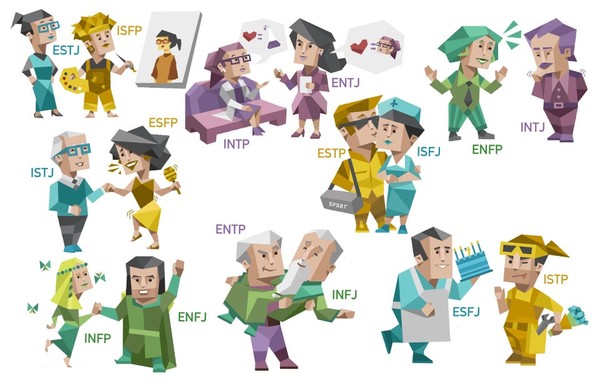Back in my dark edgy tween days, I was one of those ten-year-old girls who posted personality quiz results on Facebook every ten minutes. And so were my other friends at that time, but sadly they grew out of it pretty quickly. I, on the other hand, still take random quizzes just for the hell of it, although now I have to keep it as my dirty little secret. In a way, I miss the times when I could discuss the results of my “Which Harry Potter character are you?” quiz, conduct a full analysis of Werewolf roles, and draw a blueprint of Ninja Warrior challenges without fear of being laughed at. I used to feel that I was such a snowflake for being the only one unable to move on from these “outdated” or “childish” things. Well, I still do — but MBTI has made me realize that it’s not something to be ashamed of.

The Myers-Briggs Type Indicator (MBTI) test classifies people’s personalities into 16 categories based on four traits: extroversion (E) or introversion (I), sensing (S) or intuition (N), thinking (T) or feeling (F), and judging (J) or perceiving (P). Based on your results, the test explains how you see the world and interact with others. In my home country, it is still a niche interest, mostly attracting psychology junkies such as myself. I couldn’t be happier when I learned that MBTI is hugely popular in Korea; it is featured in many television programs, discussed by top-tier celebrities and influencers, and used in advertisements by major companies.
According to MBTI, I am somewhere between an INFJ and INTJ. I was a true INFJ for most of my life, but apparently I’m more of an INTJ now — possibly due to the pressures of a STEM institute. I have a love-hate relationship with my type, just as I do with myself. I pride myself in being an INFJ, the rarest MBTI type that is said to make up only 1 to 3 percent of the entire world population. But because of its rarity, it is also one of the types that are least suited to fit in the harsh real world. Known as a walking ball of stress among the MBTI community, this type is notorious for representing an overthinking, oversensitive, and self-loathing bunch of people who hide behind a passionate, altruistic facade.
I am smart enough to realize that all of these personality tests are probably pseudoscience at best, and should be taken with a grain of salt. However, through confirmation bias and the Barnum effect (a psychological phenomenon wherein someone believes a common fact that is made to look as if it is tailored to a specific group of people only), I have experienced that MBTI theories are very often true. As an example, it predicts that intuitive types, who view the world through patterns and possibilities, rarely feel comfortable around sensor types, who are practical and well-grounded. Stereotypical sensors would never understand why I keep collecting “useless” mini animal figures just because they are cute, or why I feel bad for the gift box that someone threw away, as neither possesses any tangible values. Sensors are also often portrayed as being highly productive, diligent hard workers. True enough, both of these descriptions match my mom, an ISFJ/ISTJ, and one of my close friends, an ESTJ, perfectly. On the other hand, stereotypical intuitive types are said to only be able to work well under “the right mood”, since they much prefer to go with impractical galaxy brain ideas than follow tried-and-true conventional approaches. I happen to be one of these textbook intuitives, much to the chagrin of my mom and friend.
A more obvious comparison is the classic example of introverts versus extroverts. I prefer to spend my spare time being a hermit inside my room, cuddled up under a blanket reading Harari books while sipping a warm cup of green tea latte. I will instantly fall asleep after a few hours of “too much socializing” (which includes meal plans I voluntarily join, parties I’m not forced to attend, and group shopping sprees I initiate). Meanwhile, my ESTJ friend makes plans with just about everyone she knows right after exams are over, and she can directly continue her homework after hanging out without much problem. When I asked her about this productivity secret, she simply chuckled and said that meeting people energizes her.
These “coincidences” are interesting to say the least, but I’m aware that there are as many counterexamples as there are proofs. For instance, one of my middle school best friends is also apparently an ESTJ, but she procrastinates as much as I do and is nowhere near as orderly as my other ESTJ friend. After all, it’s impossible to categorize the billions of humans who have ever lived in this world into a measly sixteen boxes. However, that doesn’t mean that having the idea that each person has their own way of doing things is useless. Thanks to MBTI, I am able to think about why other people don’t appreciate the small little things as much as I do, and realize that I’m not the only person who always feels like the odd one out even among their closest friends. It helps me be proud of myself and appreciate other people’s differences at the same time, so where’s the harm in that?

